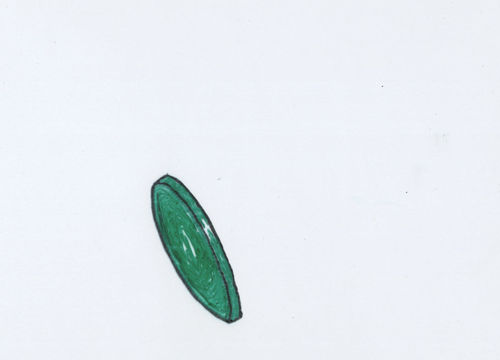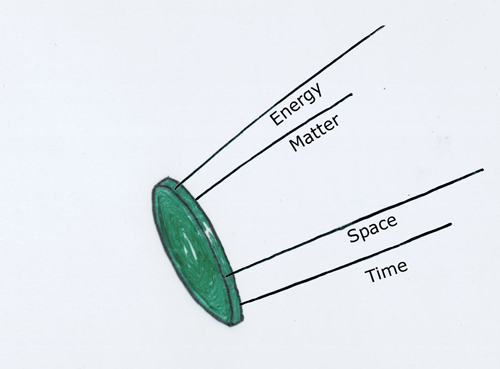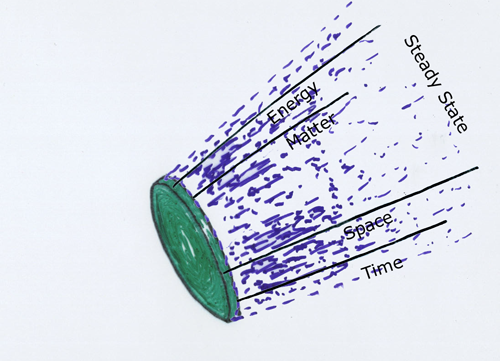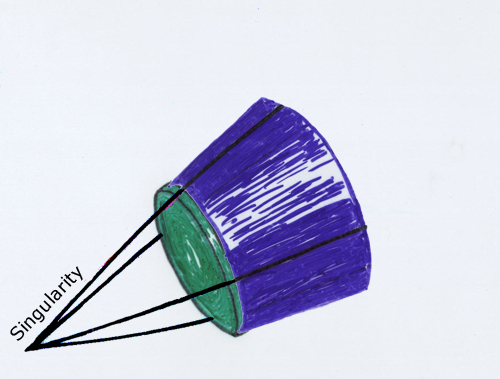An alternate metaphor for creation.
No matter where you stand in the Creation/Evolution debate, I suspect that this entry will peeve the socks off of you. Here’s why: I am of the opinion that most of the debate; most of the arguments for and against; most of the evidence which is bandied about by both sides, is totally irrelevant. That statement, alone, is justification enough for people in both camps to want to crucify me. But there is method in my madness. Until you’ve had a chance to figure out what it is, please put your hammer and nails away.
Now, right off the bat, a bunch of people will jump to the conclusion that I think it is irrelevant whether we were created or merely evolved. I didn’t say that. Whether God exists and, if so, whether He created the universe and everything in it – including us – is a question of extreme importance. It’s not the question, but what is said about it, which I think is largely irrelevant.
A personal odyssey
While I was growing up, just about the only things I ever heard about evolution were derogatory statements about how stupid it was and how only fools would believe in such nonsense. I don’t remember ever being taught what evolution is or having a serious discussion about what might be wrong with it. It was just ridiculed. Therefore, it was quite a shock to learn in High School biology that evolution has a logic of its own. It is something which can be believed by intelligent people. It really does make sense – provided, of course, that you are willing to accept certain premises. At the time I was too uninformed to grasp the implications of some of those premises. Nor was I experienced enough to spot some of the logical fallacies and the faulty science which was presented. In later years, when I was sharp enough to spot such things, I discovered that evolutionists don’t have a corner on logical fallacy and bad science. Many creationists have the same problem.
I will say, though, that my High School teacher went out of his way to provide a balanced view of the whole subject. Partially as a result of my respect for the teacher and his even-handed approach, I went through a stretch of several years where I believed that God created the universe and got life started, but that He used the mechanism of evolution, particularly natural selection, to develop more complex forms of life.
Sometime during my early 20s the preacher at the congregation I was attending taught a series of lessons on evolution. Much to my surprise, he didn’t go into a bunch of scientific arguments to prove evolution wrong. Instead, he approached the whole subject from a philosophic and spiritual angle. He pointed out what the philosophical underpinnings of evolutionary belief are, and what the end results of those philosophies are. Frankly, I don’t remember very many specifics of what he said. But that series of talks helped me realize that I could not ride the fence. There is a clear-cut choice to be made between two opposed and irreconcilable belief systems. The creation accounts in Genesis are actually representative of a particular philosophic outlook. Likewise, evolution theory is an outgrowth of another philosophic outlook. These philosophies or belief structures are mutually exclusive. They cannot both be true. You’ve got to pick one or the other. Though I still had doubts, I came down on the side of creation.
Several years later, as an intellectual exercise, I tried to set all my beliefs and prejudices aside, (as though that were possible) and take an unbiased look at the question of origins. In some ways I was reluctant to do so for fear of what I might find. As it happened, the results of this quest were very beneficial and greatly reinforced the decision I had made earlier in favor of creation.
My reasons for belief
There were several things which helped persuade me that we, and the entire universe, came into being through an act of divine creation. One was symbiotic relationships. The odds of one complex organism developing into its current form are staggering enough. The odds of two completely different, yet interdependent organisms doing so simultaneously is orders of magnitude more improbable. That there are not just one, but dozens, of these relationships in nature stretches incredulity to the breaking point. The most common symbiotic relationship, and one for which I can see no evolutionary benefit, let alone necessity, is the one between male and female. Both systems must not only work perfectly, but synchronize with the other, or the species dies.
Yet, improbable things do happen. I’m told there is mathematical proof that the highly improbable often does occur. Since anything much beyond basic math goes completely over my head, there is no way for me to check the proof. I’ll just have to accept it as accurate until somebody else demonstrates otherwise. Lest somebody trot out the lottery as an example of this occurring in every-day life, let me point out the fallacy in the illustration. It is true that regardless of the odds of any one person winning the lottery, somebody does win it. But to equate the probability of winning the lottery with the probability of something evolving is a false analogy. Assuming the integrity of the lottery commission, it is fore-ordained that someone will win. There is absolutely nothing which says that evolution will occur at all – unless you are willing to concede that evolution is predetermined. And, if something or Someone is there to predetermine it, there is no need for evolution at all. If something or Someone is capable and powerful enough to predetermine evolution, then there is no logical basis for excluding the possibility that that same something or Somebody created things as they are.
Reason 2
A lot of people like to ridicule the church of the Middle Ages, often unjustly, for holding back science. Yet there is one medieval belief which evolutionists doggedly hold on to even though it flies in the face of all observation and experimental evidence. It’s the belief in spontaneous generation. In order for something to evolve at all, the threshold between the non-living and living must first be crossed. That has always seemed an impossible hurdle to me. It’s interesting that in all the brouhaha about the experiments where some amino acids were formed by shooting electrical sparks into gas mixtures, most commentators failed to mention a few things. They neglected to point out that the experiments were made under very controlled conditions. Conditions which were very, very different than anything which ever existed on early Earth. They also neglected to mention that a few acids weren’t the only things produced by the experiments. They also produced deadly toxins which would kill all life. I won’t go so far as to accuse anyone of deliberate dishonesty, but it does smell of self-delusion.
Reason 3
For many years, I’ve suspected that life, instead of evolving, may actually be devolving. In other words, each succeeding generation is, on average, somewhat less capable and viable than the preceding one. Recently I came across something which not only bears this out, but strengthens my belief in creation. To illustrate, I’ve spent a good portion of my life dealing with audio. I’ve spent more hours than I care to think about behind a mixing console, editing and designing and operating sound systems. Along the way I’ve learned that editing and the tailoring of sound is a subtractive process. It mostly involves the destruction of information.
Yes, it is possible to manipulate sound, but only if it first exists. If it isn’t there to begin with, you can’t manipulate it. Similarly, once material is removed, there is no way to re-create it, even in theory, from what is left. There are many illustrations of this. I’ll give you but one example. That MP3 you’re listening to on your Ipod contains much less material than in the original. In order to fit it into a small file size, the audio is compressed. This is done by throwing away the (hopefully!) least important information. The process cannot be reversed. The information is gone and there is no way, even in theory, to predict what should have been there. This is why MP3s can never be restored to the full quality of the original. It’s also why its inadvisable to edit an MP3 and then store it again in the same format. Each time you do, you lose even more quality, which cannot be restored.
The same sort of thing happens in genetics. There are many ways to lose genetic information. In all the experiments which have been performed, no mechanism has ever been found that increases the amount genetic information. Where did the extra information, let’s say a horse has in comparison to a fly, come from? As far as I know, there isn’t even a natural process to repair or replace the defective information caused by mutations, let alone something which would generate the extra information required for more complex organisms to evolve from less complex ones. Clearly, something else is at work. I think it points to creation.
Reason 4
The thing which convinced me the most, however, is the fact that we human beings have a sense of right and wrong. I don’t see how moral sensibility, convictions, spiritual awareness and the concepts of ‘ought’ and ‘should’ could ever be produced through a process of evolution. It simply doesn’t make sense.
God’s dilemma
Now I’m sure that there are plenty of people who are more than willing to poke holes into every reason I’ve given for my belief in creation. They’ll point out that the data I’ve mentioned is, at best, ambiguous. I agree with you that there is no definitive and indisputable proof for creation, or even the existence of God. In fact, that is precisely one of the points I’m trying to make.
So then, if God really exists, why does He make us jump through all these intellectual hoops? Why doesn’t He show Himself to us openly? Why does He leave room for doubt? On occasion I myself, have wished that God would disclose Himself more openly. But think about it from His perspective for a minute. How can God disclose Himself to us without also destroying our choice of whether to believe or not? If the Bible is correct in saying that God desires our love, how can God receive it if He takes away the choice to reject Him? God wants our love freely given, not grudging acknowledgment of His existence.
Because God, if He exists, cannot manifest Himself to us without destroying our freedom to disbelieve, there will always be a certain amount of ambiguity in the data. How you interpret the data depends largely on the philosophical outlook you bring to it. For those whose philosophic outlook embraces the concept of God, the evidence for creation is overwhelming. For those whose philosophic construct excludes God, there is no alternative to evolution. Therefore the data must be interpreted to support that theory.
Digging myself in deeper
Along the way, I’ve noticed plenty of absurdities on both sides of the aisle. For example, I think there’s a fundamental contradiction at the heart of much of the environmental movement. Many of those in the movement are fervent evolutionists. That being the case, I have never understood why they get so upset at the loss of a species or three. If natural selection and the “survival of the fittest” really are the agents of evolution, it seems to me that if a species is eliminated, it only proves it wasn’t fit to survive anyway. The fact that people get upset about it says to me that something besides evolution is at work. They are protesting on the basis of moral conviction which, itself, cannot be a product of evolutionary processes.
Evolutionists also like to accuse creationists of taking a “God-of-the-gaps” position. In other words, the only reason we need God is because we can’t yet explain something. Given enough time (and research dollars!) however, all the mysteries of nature will eventually be explained. Once we understand the mechanisms involved, there will no longer be room for belief that God, if He exists at all, created anything. There are at least two fallacies with this argument. One is that it conveniently ignores the problem of how energy or matter came into being in the first place. Regardless of the mechanism by which everything has since been ordered and arranged, how did it come into being to begin with? Evolutionists have no convincing answer.
A second fallacy is to assume that because something could occur in a certain way, that it actually did, or does, occur that way. For example, it’s possible that I could enter these words by dictating them into speech recognition software. But just because it’s possible does not prove that’s how I’m doing it. Similarly, just because there may be a purely naturalistic means of obtaining a certain outcome does not, in itself, prove that the outcome was obtained by purely naturalistic means. Nor does the existence of a naturalistic process exclude the possibility that God exists or that He is involved in that process. On the contrary, if God invented nature, we ought to expect that much of what He does is through naturalistic means.
Creationists are not immune from absurdities either. For example, one of the arguments I’ve heard in support of the young-earth hypothesis is that the oceans aren’t salty enough. The argument goes that the oceans would contain much more salt than they do if the earth was older than several thousand years. While making this argument the creationists fall into the same trap as they accuse the evolutionists of living in – uniformitarianism. But how can you possibly know how salty the oceans ought to be based on current erosion rates, or the current size of the oceans, or the current rate of precipitation, or the current salt content of the earth, etc., etc.? You’re assuming that the rate of change has stayed relatively constant. But how can you know that? You can’t.
My biggest beef with those in the creationist camp, however, is that you are fighting the wrong battle. The creation/evolution debate is not primarily a scientific one. As I stated before, it’s really about philosophy, not science. The data will always be somewhat ambiguous. There will always be another scientific factoid which throws doubt on the proof you have just so confidently asserted. You will never be able to prove creation and, therefore, the existence of God as a scientific fact. If such a god could be proven he wouldn’t be worth believing in, anyway. If God exists He, by definition, must be beyond nature and, therefore, outside the space-time continuum we experience. He transcends nature and, therefore, transcends science. You will never see Him unless you look through the eyes of faith. If we have faith, then I agree, the universe is filled with evidence which points to God. But without at least an inclination toward faith, there will always be a way to explain the evidence away – until, that is, God breaks through His self-imposed curtain and every eye beholds Him. Only then will there be no need for faith. Please don’t misunderstand me. I agree that there is value in pointing out scientific error and teaching correct science. There’s no doubt that many are helped to find Christ by your clearing away some of the misconceptions that are out there. But never forget that science, even good science, is not the answer. It’s a spiritual battle, not a scientific one. As a friend of mine pointed out, it’s not really so much about evidence as it is about morals. When you get right down to it, most people don’t refuse to believe because of the lack of evidence, but because they don’t want to submit to God’s authority. They want to do their own thing.
I haven’t actually done this, but let me pose a couple of theoretical questions which illustrate just how slippery ‘proof’ can be. For the sake of discussion, if I were to ask those in the evolution camp to describe how the universe would appear if creation were true, I expect they would answer, “Just about the way it does now.” Similarly, if I were to ask those in the creation camp to describe how the universe would appear if evolution were true, I would expect them to answer, “Just about the way it does now.” Same end state, same data, two vastly different different interpretations. How you get there depends on your philosophy, not science.
Which came first, the chicken or the egg?
Now that I’ve managed to thoroughly alienate everyone in both camps, do I have an alternative to suggest? Well, ahem, yes I do. Hang on to those hammers and nails a little bit longer.
While giving a talk on Genesis, several years ago, a speaker posed an interesting question. He asked something to the effect of, “If a couple of days after God created him, Adam took his chain saw and cut down a tree, how many rings would it have had?” The point of that fanciful question was that if the Genesis record is correct, then most of the plants and animals must have been created in a mature or adult state. That concept got me to thinking. If, at the time of creation, the plants and animals appeared older than they actually were, is it possible that the same applies to nature and the universe as a whole? If, as many think, the six creative days of Genesis refer to actual days rather than eras, it must be so.
But if the universe and the Earth, in particular, are as young as Genesis seems to indicate, why would God make them appear older than they are? When I ran the idea that the universe might look older than it is by a believing friend of mine, he rejected the notion out of hand. His reason for doing so is that God is honest. To make the universe appear a different age than it is, would be deceitful. I replied that God hasn’t deceived anyone. In His Word He’s told mankind precisely what He’s done. My friend wouldn’t buy it, even though he believes the Genesis account.
It wasn’t until just recently that my thoughts came together in some sort of coherent way. I think I now have a decent construct to explain what’s going on. First, I’ll try to describe my theory in quasi-scientific terms, then by using a metaphor.
A graph for all seasons
Since it’s a little hard to explain my concept just in words, I’ve drawn some diagrams to help you visualize what I’m talking about.

Consider a disk. This disk represents a slice of our experience at the present time. By ‘our experience’ I mean not only our individual existence, but also the state of the whole world, our universe and the whole of nature. It should be obvious that the physical laws which govern this slice of existence are uniform and consistent. If chemistry, physics, thermodynamics and the like were erratic, or were self-contradictory, the universe, and we along with it, could not exist.

Now think of the disk as being bound, or defined, by several constraints. One of them is time, another space, another matter, a fourth energy and so on. I don’t claim that these are the only constraints – there may well be other dimensions – but these are enough to illustrate the concept. For the purists among you, yes, I am aware that these dimensions, for example matter and energy, can be converted from one to another. Think of the rim of the disk as a visual representation the transforms.
What happens if we extrapolate the dimensions out into the future? The laws of physics indicate that eventually everything will reach the same, uniform temperature. All motion will cease. The universe will be in a state of equilibrium. In other words things will reach a stable, steady-state condition.

This, of course, assumes that nature is a closed system. But what if it is not? It is always perilous to predict the future of any system which is open to influence from the outside, on the basis of its current state. If there is something, or Someone, outside of the system there is no way to predict from within the system itself if, or how, what is on the outside will affect the system – unless the outside entity informs those on the inside what it is going to do. In his book, Miracles, A Preliminary Study, C.S. Lewis provides a useful illustration of this concept. He points out that the laws of physics accurately predict the trajectory of a set of billiard balls. But the actual motion of a ball will be very different from what was expected if, while it is in motion, someone interferes by poking it with a cue. The laws of physics predict what will happen if there is no interference. They cannot predict whether there will be any outside interference and, if so, what that interference will be.

Now if God exists and He has created nature He is, necessarily, outside of nature. In the absence of divine revelation there is no way to predict, from within nature, whether and how God will interfere with nature. Fortunately, we are not totally in the dark. Assuming that the Bible is what it claims to be – a divine revelation – we do know how God will interfere with the natural course of events. Nature will never reach steady state. A day is coming when God will call a halt to everything. Nature as we know it will cease to exist. The predictions of physics about the end-state of nature are wildly misleading, even though the laws are perfectly consistent and accurately describe current physical reality.

What do the physical laws tell us about origins? Following the laws backwards in time, they indicate that all of nature originated from a singular time and place. Scientists call this point in space-time by different names. Some refer to it as the singularity. Others call it the big bang. (For purposes of this discussion, whether the dimension lines come to a sharp point as shown in the diagram, or whether they form a smooth curve as claimed by Richard Dawkins, really doesn’t matter.)
But we again have the problem that physics cannot tell whether and how something, or Someone, outside of nature may have interfered in the past. It takes divine revelation to disclose it. Assuming that such interference has occurred, then just as the laws of physics point to a very misleading conclusion about the end of nature, they also do not give an accurate picture of its beginning. Divine revelation tells us that nature never was at singularity as predicted by the laws. Instead, nature as we know it came into being by a creative act. There is no contradiction. There is no inconsistency. In order for nature to function as it does, the laws must be as they are. It couldn’t be otherwise. But it simply does not follow that nature had its origin in a singularity. We can learn very little about the actual age of the universe or our earth by looking at present conditions.

A gaming metaphor
Let me give you another illustration which might make things a little clearer.

Look at this ‘screenshot’ from a hypothetical role-playing game. A character, let’s call him Gus, lives in, and travels through, a virtual world. From his perspective the mountain in the background is many miles away. The comparatively small hills in the foreground have eroded to their current state through countless thousands, or millions of years. The road he’s walking on was built by means of a government public works program and took a decade to complete. The ruins he’s passing are the remains of a previous civilization which was destroyed 500 years ago.
Gus has freedom of action. He can make decisions and react to his environment. He interacts with other characters, and they with him.
There are several important points to note about this game: a) The game program and the rules which define the game are consistent and well-ordered. If they were not, either the computer would ‘hang’ in some undefined state or behave in some unpredictable (and therefore, unplayable) way. b) Though Gus and the other characters are autonomous in the sense that they can ‘reason’ and make their own decisions, their conduct is constrained by the limits of the program which defines their environment and what actions are ‘legal.’ In other words they cannot, by definition, do anything which violates the programming of the game. c) The state of the virtual environment in which Gus and the other characters find themselves indicates little, or nothing, about the history of the game itself. d) The rules which govern the environment and how the characters behave, do not predict accurately either how the game began or how it will end. e) The game is not a closed system. It is subject to interference by any number of outside influences. f) By observing their environment the characters in the game might be able to infer the existence of a programmer and a few of his characteristics but, in the absence of communication from the programmer, it is impossible for the characters to ever know him.
Now think about the parallels between this virtual environment and our own experience. a) Nature is governed and controlled by consistent and predictable laws. If it were not, we wouldn’t be here to contemplate it. b) We possess free will and, within broad limits, are autonomous. Yet we, too, are constrained by the limits of our environment. Nature is very unforgiving when we try to violate those limits. c) From Gus’ perspective those hills have been there for thousands or millions of years. In reality, however, the programmer built them into the program only last month. Similarly, to Gus the hills look many miles away. From the programmer’s perspective they are only a few pixels distant. Gus cannot even imagine the dimensions in which the programmer lives. If God exists, He is beyond our ability to imagine, let alone comprehend. Our environment may be to us as the virtual hills are to Gus. d) The rules of the game might indicate thousands of years of virtual ‘history,’ going clear back to the formation of the environment itself. It may also project various endings of the environment. In reality, however, someone booted the computer up half an hour ago. Similarly, the actual end might be very different than the projected endings to the game. For example, there is no way for any character in the game to know that five minutes from now someone will hit the computer’s off switch. Similarly, we cannot say anything definite about either the beginning or the end state of nature merely by observing the current state of affairs. In the absence of revelation, there is no way for us to know anything about its true origins or ending. e) The course of the game might be altered drastically by external input from keyboard or mouse. The characters within the game have no way of knowing when or if such interference will occur. Similarly, if nature is not a closed system, we have no assurance that there will not be interference from the outside. f) We’re like the characters in the game. We may be able to infer the existence of a Creator from what we observe about our environment (Romans 1:20 says that His power and divinity are clearly recognizable) but, unless God chooses to reveal Himself, there is no way for us to really know Him.
Do you think my metaphor is far-fetched? Have you ever heard of the a-life movement? (Sometimes also spelled, alife.) It stands for ‘artificial life.’ There really are a bunch of people out there who are trying to write computer programs which not only simulate life, but produce life. A while back I was browsing the shelves at the local library looking for a book on Java programming. In the process I ran across Creation: Life And How To Make It by Steve Grand. It was a fascinating, yet somewhat disturbing read. Though I disagree with the man that we humans will ever be able to truly create life, he was able to program critters which did show some of the characteristics of living things. (The program is called Creatures.) One of the interesting issues which was highlighted by the program was the right of the creator to also kill or destroy the critters he created. That’s a very important insight which I only obliquely implied in my game metaphor.
Solomon wrote that there’s nothing new under the sun (Ecclesiastes 1:9). I was feeling pretty smug about my metaphor and how it makes my concept of creation easy to explain. I was congratulating myself for coming up with such a brilliant idea. Well, not too long ago, I was reading an anthology of Science Fiction short stories. One of them was about a programmer who created a virtual environment. The characters in the environment are alive and gradually develop the technology to make computers. They end up programming a virtual environment with, you guessed it, characters who are alive and able to develop their own technology. The author states in the introduction, that the story bothered him for a long time. He didn’t say so, but I gather it was because it suggests that we, ourselves, may be the product of Someone else’s design. Unfortunately, I didn’t make note of the title of the story, or the author. It may have been Poul Anderson. In any case, there went my claim to an original idea.
All ends well that ends (a summary of this long-winded ramble)
I began this essay by saying that I think much of what is said in the Creation/Evolution debate is irrelevant. The reason I think so is that I do not believe that origins can be correctly derived from observing the present state of things. If God exists, and He created nature, then the beginning must have been very different than projecting physical laws backward in time would indicate. We’re not in a closed system. Therefore, without divine revelation neither the past nor the future is predictable with any certainty. If that is so, then much of the debate is over non-issues. In the long run, arguing about science won’t prove anything. But, then, Paul said it long before I did in 1st Timothy 6:20.
Well, there you have it, folks. Now, if you must, go ahead and break out those hammers and nails.













